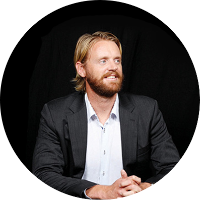
Patrick Hollingworth
Travels From Perth, WA | Bio | Send An Enquiry
Is the future uncertain? Are people within your organisation anxious? How can they work through that barrier to not only face, but embrace, inevitable change?
Here's Mountaineer and Adventurer, Patrick's Hollingworth's take on how to tackle those 'Storm Clouds on the Horizon'.
Patrick is available for keynote presentations, half day or full day workshops or one week programmes.
Storm Clouds on the Horizon
Over the past five years or so I’ve been working with a bunch of different organisations, helping them develop and skill-up their leaders and teams to do their work better and safer in challenging and evolving workplace landscapes. This work has taken me across Australia and more recently, across the globe. In this time I’ve been lucky enough to be given access to the inner sanctums of some really cool businesses, both large and small, and I’ve learned a tonne of stuff. It’s been fantastic.
I’m a big believer in the importance of organisations and the way they do their work – when you think about, pretty much the entire wellbeing of our society depends upon organisations functioning effectively. So for me, this is definitely work worth doing.
Over this time, I’ve noticed a shift in the way that organisations are reacting to the global landscape in which they’re playing. What started out as an almost imperceptible change in the air is now gathering pace. It seems to me that many people see storm clouds on the horizon. The future is uncertain, and people and their organisations are anxious.
And I know what this feels like – 15 plus years of mountaineering across the globe and seven major expeditions to the Himalayas has well and truly seen to that. Discomfort. Unease. Overwhelm. Being sh!tscared. Yep, I certainly know what that feels like!
And thus began my serious quest to really understand what’s happening out there in this world that is getting faster and more complex, and to examine better ways that we as individuals and in our organisational teams can do our work in these uncertain and ambiguous times. That’s what drives me today - sharing ideas to help us all cope with volatility, uncertainty, complexity and ambiguity. I hope this helps.
Welcome to the VUCA Century
How is your work going in this century so far? The combined forces of globalisation and technological innovation have changed the business landscape so much since the new millennium rolled around. Are you feeling comfortable, confident and prepared? Or are you feeling anxious, overwhelmed and perhaps a bit uncomfortable? If that’s the case, it’s OK, you are not alone...
I call this the Comfort Paradox. Why? It’s in our DNA to improve our lot in life, to increase our level of comfort. When you stop and think about it, humanity’s relentless drive towards technical innovation and sophistication is all about enabling greater ease with which to secure our needs as humans. The irony however is that in our efforts to make ourselves more comfortable, we are in some ways making ourselves less comfortable.
Every day we see examples of improvements in technology that are designed to improve our standard of living, but are actually undermining our desire for comfort – whether it be the sense of urgency to remain abreast of the latest smartphone model, through to the latest challenge to our business of disintermediation (that’s for you, Matt) from a ‘disruptor’ who only left university a few years ago - all of this comes via technology that wasn’t available a mere 15 years ago. The impact this technological change is having on organisations is unprecedented.
For the most part, we’ve been able to handle it and contain that sense of growing unease. Yet we won’t be able to for much longer. Why is this? It’s called Moore’s Law – if you haven’t heard of it before, you are definitely familiar with it – it’s the observation that every 24 months or so the processing power of the computer chip doubles, leading to exponential growth in computing power.
This exponential growth is what gives us a computer chip today that is 30 million times faster than one from the early 1970’s. We’ve just reached the knee in the exponential curve… and it’s about to go vertical.
Why does this make us uncomfortable?
Put simply, humans like being comfortable. But what is comfort? For most of us, comfort is all about stability, certainty, simplicity and clarity. What do politicians often talk about when seeking election to government? Stability. Why do we like knowing the daily weather forecast? Certainty. Why do reports start with abstracts or executive summaries? Simplicity. What are you seeking when using a map? Clarity.
The reality however is that we’re moving from a world of stability, certainty, simplicity and clarity to one of Volatility, Uncertainty, Complexity and Ambiguity. Package these four words up into an acronym and you get VUCA, US military parlance for the new (or lack of) world order post Cold War cessation in the early 1990’s, but also an appropriate summation of the landscape in which all of our organisations are playing in today. The transition to VUCA is underway – and with it comes the move from comfort to discomfort.
What’s the problem with VUCA?
“So what?” you might be thinking, “I can deal with a bit of uncertainty”. That might well be the case, but the reality is that some of your employees probably can’t. VUCA tends to result in people withdrawing from their surroundings, bunkering down and protecting themselves from the unknown. It’s certainly not conducive to high-performance. And we see this on a daily basis, in the form of chronic employee disengagement (from which the annual predicted cost to the Australian economy is $50 billion, and to the US economy it’s closer to $500 billion. That’s half a trillion dollars).
What's the Solution?
We need to be OK with the idea of VUCA and how it will impact the world in which we live and work. As with many things in this the VUCA Century, the idea of getting comfortable getting uncomfortable may seem paradoxical – but that’s OK. After all, getting comfortable with discomfort means being OK with paradox and contradiction.
Think like an Explorer
So, what’s the core solution? More than anything, I reckon we require a mindset shift in our organisations. We need to be much more open to the new opportunities that VUCA brings, instead of just focusing on the sense of overwhelm and dissonance it causes. I call this mindset the Explorer’s Mindset; after all, being OK with discomfort is something that explorers have had to master over many centuries. This mindset requires an inward-looking focus as much as an external orientation, and a predilection for agility and curiosity.
So, how can you develop your Explorer’s Mindset? To start with, there are three things you’ll need to do:
• Understand your underlying drivers and motivation (without drive and motivation, you’ll be slow and easily distracted and will lack resilience).
• Develop a natural curiosity and open approach to new ideas and landscapes (without curiosity and openness, you’ll be single minded and suffer from tunnel vision).
• Be OK with deviating from tradition and norms (without flexibility and adaptability, you’ll be rigid and cumbersome).
Go Alpine Style
In addition to changing our mindset and thinking differently, I reckon that in our organisations we need to act differently too. In the relative stability and certainty of the pre-VUCA world, the most successful organisations were generally the largest and most powerful.
In today’s world however, the cumbersome nature of large and powerful entities won’t necessarily cut it, and this explains why you’re seeing small nimble start-ups go from birth to industry disruption within the space of a few years (remember, Airbnb was only born late 2008 and its latest estimated market cap is north of $20 billion).
Continuing the theme of adventure and exploration, I refer to this old way of doing things as Expedition Style. In mountaineering, it’s when we basically try and over-power the mountain, camping at her foot for months on end and attempting to manhandle her into submission by the use of excess rope and manpower. It certainly works, but it’s neither the most graceful nor efficient way of doing things. Much better I think that we go Alpine Style, an ethos which sees us climb fast, high and light, and has us up on the summit and back down to safety before the other teams have even left base camp. Now, Alpine Style may not be for everyone, but for those who are prepared to do the work and make the commitment, I think it’s a much better way to go.
We can explore these ideas in more detail, to help you get used to this new way of doing things. It won’t be easy, and some will need more help than others. But it must be done if our organisations are to survive. So here’s to thinking like an Explorer, and going Alpine Style! I hope you enjoy the journey!
As mentioned above, Patrick is available for keynote presentations, half day or full day workshops or one week programmes. He travels ex Perth.
For more information on Patrick, his speaking fees and/or to his check availability to speak at your upcoming event, please contact the team at Great Expectation on 1300 55 64 69 or at team@greatexpectation.com.au


